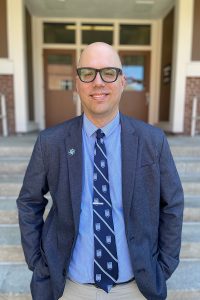College of Education and Human Development announces leadership transition
The University of Maine College of Education and Human Development is getting new leadership heading into the 2024-25 school year.
After three years as dean of the college, Penny Bishop stepped down at the beginning of July to move closer to family. Ezekiel “Zeke” Kimball, who has been associate dean for undergraduate and teacher education, has been named interim dean while a national search for a permanent dean takes place.
“Penny has done remarkable work and made it easier for many in the college to do their own exceptional work. She will be an incredibly difficult act to follow,” Kimball said. “Returning from the COVID-19 pandemic, she worked hard to help the college recapture a sense of community and to be accessible to students, faculty, staff and other stakeholders. The foundations of that work will remain, and we will continue to build those connections moving forward.”
Highlights of Bishop’s tenure include establishment of several new academic programs, including a special education concentration as part of the Ph.D. in education program. She helped launch new summer programs for educators, created opportunities to celebrate those who work in the college, and led a more than 300% increase in philanthropic giving.
Bishop and Kimball worked together to advocate for $3.3 million in Congressionally Directed Spending (CDS) that was included in a federal budget package passed earlier this year. The funds were secured for the University of Maine System at the request of Sen. Susan Collins, vice chair of the Senate Appropriations Committee, and Sen. Angus King. They will help the college, working with other UMS campuses, expand ongoing professional development, mentoring and other evidence-based support for rural teachers and school leaders statewide.
“We have worked diligently over the last few years to clarify the role that the college plays at the university, system and state levels as Maine’s largest teacher teacher preparation and training program. Over the next year, I look forward to working with our team and our partners to make even more progress toward building sustainable and resilient schools and communities statewide,” Kimball said.
Kimball joined the college in July 2022. In addition to helping secure the CDS funding, he has led major research-practice partnerships focused on broadening pathways to STEM (science, technology, engineering and math) teaching and improving early childhood education outcomes. He has also led efforts to improve the college’s physical infrastructure with several renovated student spaces and instructional facilities to be unveiled during the next academic year. Prior to UMaine, he served as a faculty member, associate dean for operations and planning, interim chair of the Department of Student Development, and associate dean for academic affairs at the University of Massachusetts Amherst. He earned his bachelor’s and master’s degrees in the University of Maine System and his doctorate in higher education from the Pennsylvania State University.
With Kimball stepping into a new role, Justin Dimmel has been named associate dean for academics and student engagement in the college.
An associate professor of mathematics education and instructional technology, Dimmel has taught both undergraduate and graduate courses. He is the founder and director of the Immersive Mathematics in Rendered Environments (IMRE) Lab, which designs virtual reality learning environments and investigates how VR can transform STEM education. In 2022, he received a National Science Foundation CAREER Award, the organization’s most prestigious award for early career faculty. He and Associate Professor of Mathematics Education Eric Pandiscio led a team that developed the SunRule, an interactive sculpture that harnesses the rays of the sun to help users explore multiplication and division. The project was selected for the university’s Maine Innovation Research and Technology Accelerator (MIRTA) program, which helps UMaine researchers turn their ideas into marketable products and services that lead to job creation and economic growth in the state.
“I came to UMaine because I believe that the College of Education and Human Development, situated in a rural, flagship research institution, is uniquely positioned to contribute to educational and economic success throughout the state, as well as regionally and nationally,” Dimmel said. “I want to do everything I can to ensure that the college endures as an inspiring and supportive academic community, where research, learning, teaching and service thrive.”
Dimmel, who joined the UMaine community in 2015, earned his Ph.D. in mathematics education from the University of Michigan. He will start his new role as associate dean in August.
Contact: Casey Kelly, casey.kelly@maine.edu


